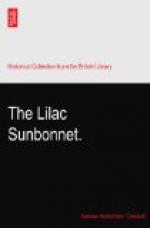“Father,” said Ralph, “I cannot tell you everything at present, because the story is not mine to tell. Can you not trust me?”
“I could trust you with my life and all that I possess,” said his father; “they are yours, and welcome; but this is a matter that affects your standing as a probationer on trials in the kirk of the Marrow, which is of divine institution. The cause is not mine, my son. Tell me that the cause of your quarrel had nothing to do with the Marrow kirk and your future standing in it, and I will ask you no more till you choose to tell me of your own will concerning the matter.”
The Marrow minister looked at his son with a gleam of tenderness forcing its way through the sternness of his words.
But Ralph was silent.
“It was indeed in my duty to the Marrow kirk that Mr. Welsh considered that I lacked. It was for this cause that he refused to company further with me.”
Then there came a hardness as of grey hill stone upon the minister’s face. It was not a pleasant thing to see in a father’s face.
“Then,” he said slowly, “Ralph Peden, this also is a manse of the Marrow kirk, and, though ye are my own son, I cannot receive ye here till your innocence is proven in the presbytery. Ye must stand yer trials.”
Ralph bowed his head. He had not been unprepared for something like this, but the pain he might have felt at another time was made easier by a subtle anodyne. He hardly seemed to feel the smart as a week before he might have done. In some strange way Winsome was helping him to bear it—or her prayers for him were being answered.
John Bairdieson broke into the study, his grey hair standing on end, and the shape of the keyhole cover imprinted on his brow above his left eye. John could see best with his left eye, and hear best with his right ear, which he had some reason to look upon as a special equalization of the gifts of Providence, though not well adapted for being of the greatest service at keyholes.
“Save us, minister!” he burst out; “the laddie’s but a laddie, an’ na doot his pranks hae upset guid Maister Welsh a wee. Lads will be lads, ye ken. But Maister Ralph’s soond on the fundamentals—I learned him the Shorter Questions mysel’, sae I should ken—forbye the hunner an’ nineteenth Psalm that he learned on my knee, and how to mak’ a Fifer’s knot, an’ the double reef, an’ a heap o’ usefu’ knowledge forbye; an’ noo to tak’ it into your heid that yer ain son’s no soond in the faith, a’ because he has fa’en oot wi’ a donnert auld carle—”
“John,” said the minister sternly, “leave the room! You have no right to speak thus of an honoured servant of the kirk of the Marrow.”
Ralph could see through the window the light fading off the Fife Lomonds, and the long line of the shore darkening under the night into a more ethereal blue.
There came to him in this glimpse of woods and dewy pastures overseas a remembrance of a dearer shore. The steading over the Grannoch Loch stood up clear before him, the blue smoke going straight up, Winsome’s lattice standing open with the roses peeping in, and the night airs breathing lovingly through them, airing it out as a bed-chamber for the beloved.




